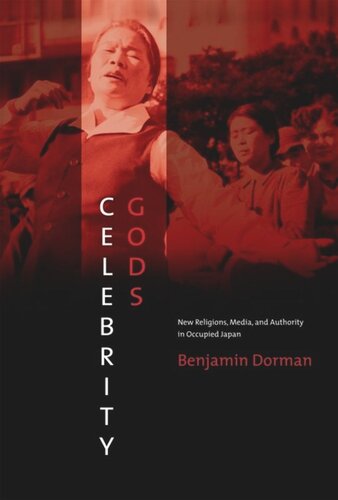

Most ebook files are in PDF format, so you can easily read them using various software such as Foxit Reader or directly on the Google Chrome browser.
Some ebook files are released by publishers in other formats such as .awz, .mobi, .epub, .fb2, etc. You may need to install specific software to read these formats on mobile/PC, such as Calibre.
Please read the tutorial at this link: https://ebookbell.com/faq
We offer FREE conversion to the popular formats you request; however, this may take some time. Therefore, right after payment, please email us, and we will try to provide the service as quickly as possible.
For some exceptional file formats or broken links (if any), please refrain from opening any disputes. Instead, email us first, and we will try to assist within a maximum of 6 hours.
EbookBell Team

5.0
60 reviewsCelebrity Gods explores the interaction of new religions and the media in postwar Japan. It focuses on the leaders and founders (kyōsō) of Jiu and Tenshō Kōtai Jingū Kyō, two new religions of Japan’s immediate postwar period that received substantial press attention. Jiu was linked to the popular prewar group Ōmotokyō, and its activities were based on the millennial visions of its leader, a woman called Jikōson. When Jiu attracted the legendary sumo champion Futabayama to its cause, Jikōson and her activities became a widely-covered cause célèbre in the press. Tenshō Kōtai Jingū Kyō (labeled odoru shūkyō, “the dancing religion,” by the press) was led by a farmer’s wife, Kitamura Sayo. Her uncompromising vision and actions toward creating a new society—one that was far removed from what she described as the “maggot world” of postwar Japan—drew harsh and often mocking criticism from the print media.
Looking back for precursors to the postwar relationship of new religions and media, Benjamin Dorman explores the significant role that the Japanese media traditionally played in defining appropriate and acceptable social behavior, acting at times as mouthpieces for government and religious authorities. Using the cases of Renmonkyō in the Meiji era and Ōmotokyō in the Taishō and Shōwa eras, Dorman shows how accumulated images of new religions in pre-1945 Japan became absorbed into those of the immediate postwar period. Given the lack of formal religious education in Japan, the media played an important role in transmitting notions of acceptable behavior to the public. He goes on to characterize the leaders of these groups as “celebrity gods,” demonstrating that the media, which were generally untrained in religious history or ideas, chose to fashion them as “celebrities” whose antics deserved derision. While the prewar media had presented other kyōsō as the antithesis of decent, moral citizens who stood in opposition to the aims of the state, postwar media reports presented them primarily as unfit for democratic society.
Celebrity Gods delves into an under-studied era of religious history: the Allied Occupation and the postwar period up to the early 1950s. It is an important interdisciplinary work that considers relations between Japanese and Occupation bureaucracies and the groups in question, and uses primary source documents from Occupation archives and interviews with media workers and members of religious groups. For observers of postwar Japan, this research provides a roadmap to help understand issues relating to the Aum Shinrikyō affair of the 1990s.